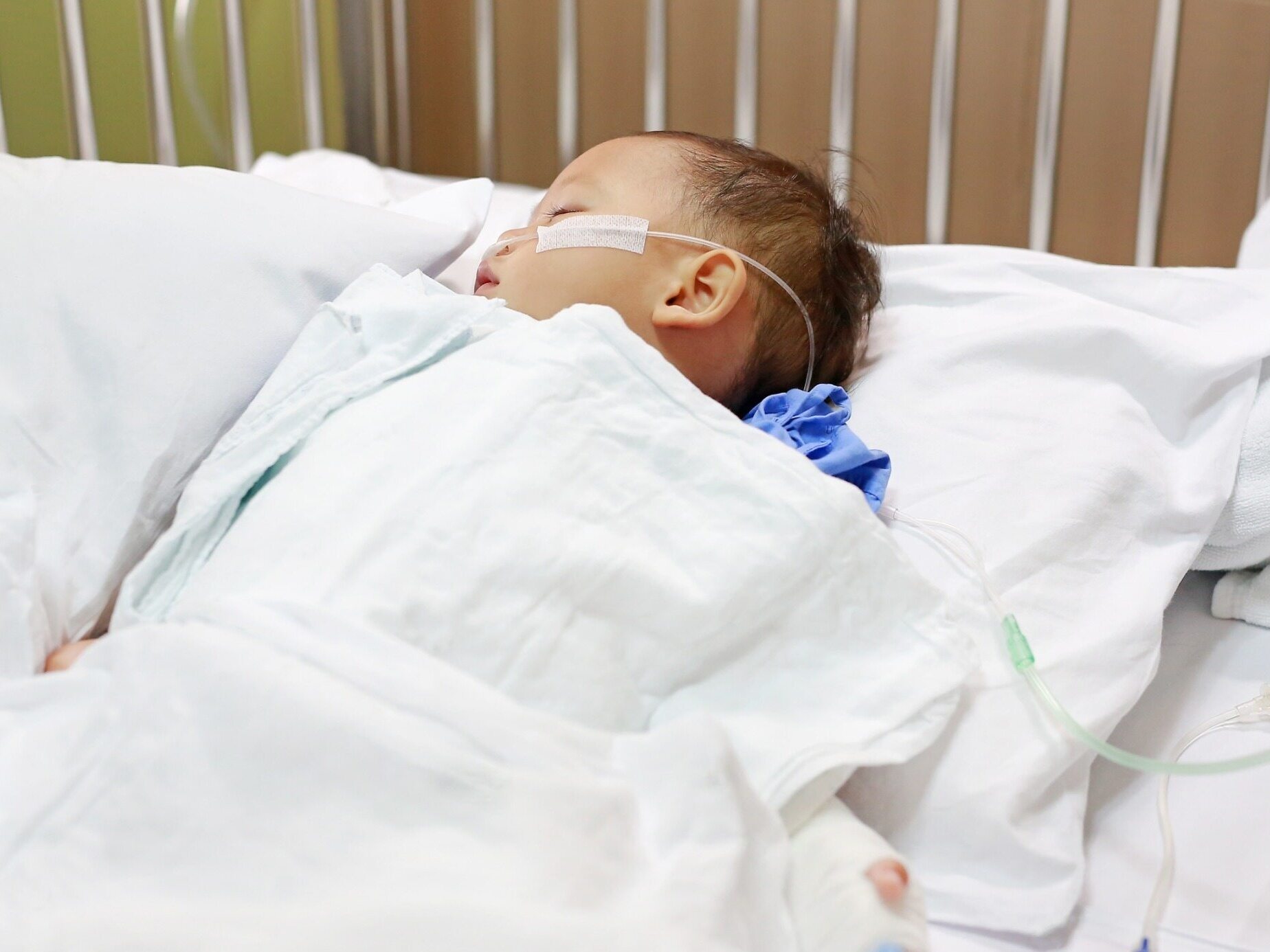RSV infections are increasing among children. Hospitals are bursting at the seams

The RSV virus causes an infection of the upper respiratory tract. It is especially dangerous for people with low immunity. Currently, there is a sharp increase in disease among children in Poland. We explain the symptoms of infection and how to protect yourself against it.
RSV infections are increasing, and many hospitals have no available beds. Doctors warn that the number of sick people is increasing and they appeal for the youngest children to be protected, i.e. stay at home. The virus is particularly dangerous for infants – the youngest patients often require hospitalization.
The RSV virus is especially dangerous for the youngest children
We contacted the spokeswoman of the Provincial Sanitary and Epidemiological Station in Lublin, Agnieszka Dados, who explained who the RSV virus is particularly dangerous for: “Respiratory Syncytial Virus (RSV) is a pathogen causing dangerous respiratory infections, especially for premature babies, small children and seniors and people with weakened immunity.
She also cited disturbing data on RSV infections: “In the Lublin Voivodeship, in December 2023, 985 cases of RSV infections confirmed by test results were recorded. This represents a 4.5-fold increase compared to the 217 cases recorded in November 2023. In the analyzed period of December and November last year, 43% of all RSV infections were infections among young children under two years of age. In December, 50% of them (205 out of 411) required hospital treatment, and in November 55% (55 out of 100),” commented Agnieszka Dados.
The RSV virus mainly attacks children. Where are hospitals overcrowded?
“Heads of pediatric hospitals are already reporting that up to 70-80 percent of hospital beds are filled by children diagnosed with RSV,” said Dr. Hab. Iwona Paradowska-Stankiewicz, national consultant in the field of epidemiology, National Institute of Public Health – National Institute of Hygiene in an interview with “Fakty” TVN.
According to information provided by PAP, the Olsztyn children’s hospital is currently recording a significant increase in RSV infections in children. The youngest children are most affected. “Our wards are full, we asked the National Health Fund for permission to hospitalize slightly older children in one of the wards intended for newborns,” said Krystyna Piskorz-Ogórek, director of the children’s hospital in Olsztyn, in an interview with PAP. In turn, the hospital’s spokeswoman, Agnieszka Deoniziak, added that currently all wards are overcrowded, and children from other regions also come to Olsztyn.
New infections are also increasing in Poznań – as Radio Zet reported, “there are already about 25 patients infected with the virus in the infectious disease ward of the Wielkopolska Pediatric Center in Poznań, the youngest are between one and three months old.” The pediatric wards of the Provincial Hospital in Kielce are also full of young patients. “When it comes to infectious disease wards for younger children, the pulmonology ward, the occupancy rate is 100%, and in the younger children’s ward, 70% of the beds are occupied by children suffering from RSV,” Elżbieta Kołodziej from the Provincial Specialist Children’s Hospital in Kielce reported on TVN24.
How is RSV transmitted?
The spokeswoman of the Provincial Sanitary and Epidemiological Station in Lublin also explained to “Wprost” how this virus is transmitted and what its symptoms are: “RSV is transmitted through droplets, through direct contact with contaminated objects or respiratory secretions of an infected person. The virus also spreads during sneezing and coughing, entering the body through the nasal mucosa and the conjunctiva of the eyes. Symptoms of RSV infection include a runny nose, cough, sneezing, fever, wheezing in mild cases, and in more severe cases, tachypnea, intercostal and subcostal retraction, excessive lung distention, restlessness, and peripheral cyanosis. The most serious, life-threatening cases include central cyanosis, tachypnea, drowsiness and apnea.
How to protect yourself against RSV infection?
“To protect yourself against RSV infection, as well as other viruses causing respiratory infections (influenza, SARS-CoV-2), you should practice hand hygiene, avoid close contact with sick people, regularly disinfect surfaces and practice coughing and sneezing etiquette. If disturbing symptoms of infection occur, such as a runny nose, cough or fever, it is recommended to consult a doctor and stay at home,” explains Agnieszka Dados.
Specialists also appeal not to send children to kindergarten or nursery if their family has a baby that is several weeks old. It is worth taking such a step to protect your baby from infection, for whom the RSV virus is particularly dangerous. Children with an infection should not be sent to institutions, nor should it be sent to institutions if the infection seems only “indistinct”. It is also important not to take a small child to places where there are a lot of people (e.g. shopping malls).
RSV infection in kindergartens and nurseries
Many people may also wonder whether children at nursery and kindergarten age infect teachers and to what extent the virus poses a threat to staff who, as a result, may later infect other children. Agnieszka Dados, press spokesman for the Provincial Sanitary and Epidemiological Station in Lublin, also commented on this for “Wprost”: “RSV transmission can occur both from children to adults and from adults to children. The source of infection is always the infected person, regardless of age. In facilities such as nurseries and kindergartens, where children and adults are in close contact, the virus is easily transmitted. Children, due to their less developed immune systems and greater tendency to have close physical contact, may be particularly susceptible to RSV infection and can effectively transmit the virus to adults, including teachers and care staff.”
However, the specialist explained that adults can also transmit the virus to children: “On the other hand, adults, including care workers, can also bring RSV to educational and care facilities. Even if symptoms in adults are mild or absent, they can still transmit the virus to children. This means that teachers and other workers may be unknowingly contributing to the spread of RSV among children.”
“To reduce RSV transmission, it is important that both staff and children in care settings follow preventive measures. This includes washing hands regularly, avoiding close contact with people showing symptoms of a respiratory infection, maintaining good personal and surface hygiene, and practicing self-isolation when symptoms of infection appear. Moreover, it is important to monitor and recognize the symptoms of infection in both children and adults in order to respond quickly and reduce the risk of further spread of the infection,” added Agnieszka Dados.






